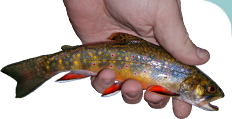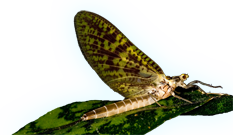Blog & Latest Updates
Fly Fishing Articles
Insects by Common Name


> > Unleaded or Hi-octane?
| Martinlf | April 14th, 2008, 3:53 am | |
Moderator Palmyra PAPosts: 3233 | Having religiously avoided lead wire for years, I've recently been considering using it again for selected applications. But I'm still somewhat reluctant. I've heard arguments to the effect that lead is not water soluble, and that in flies that break off it is not apt to be ingested by waterfowl. There may be other factors to consider. If there is little or no real risk, it seems unreasonable to forgo use of a material that may be effective. Realizing that two environmentally-minded chemists who tie flies could possibly come down on different sides of this issue, I'd still especially like to hear others' thoughts on this, especially those of people who have some scientific knowledge about the physical variables involved. I'll also add that I'm exploring the use of tungsten beads, lead free wire, and tungsten wire in different combinations to achieve the weight needed in flies like the Vladi worm (condom fly) featured in the Walt's Worm thread. If tungsten wire is too stiff to wrap, multiple sections might be bound to a hook lengthwise instead, and this might have the advantage of putting the weight where it would best invert a hook, if a hook up (or down, I suppose) style is desired. | |
| "He spread them a yard and a half. 'And every one that got away is this big.'" --Fred Chappell | ||
| Mtskibum | April 14th, 2008, 10:36 am | |
| Montana Posts: 26 | I cant answer your other questions, but lead is not water soluble. It wont rust in water. | |
| Falsifly | April 14th, 2008, 11:32 am | |
| Hayward, WI. Posts: 661 | FYI- Rust is a term used more properly with the corrosion of ferrous metals (those containing iron) and is another term for iron oxide. Oxidation being the process by which it forms. Lead oxidizes into lead oxide thus the white powder. To my knowledge lead will not dissolve in water but I wouldn’t stake my life on it. It has been banned for use in plumbing. | |
| Falsifly When asked what I just caught that monster on I showed him. He put on his magnifiers and said, "I can't believe they can see that." | ||
| Shawnny3 | April 14th, 2008, 5:03 pm | |
Moderator Pleasant Gap, PAPosts: 1197 | I won't add much new, just confirm what's been said. Metallic lead is quite insoluble, as Mtskibum says, and resists oxidation. It probably oxidizes to a small degree, though, because of the white salt coating one often finds on it (I'm guessing some combination of lead oxides and lead carbonate). Now, whether all the lead left behind from fishermen actually has a measurable effect on stream ecology beyond natural levels, I don't know. But I wouldn't want to be drinking water, as Falsifly states, that has been in prolonged contact with lead. As with most things, its the dose that would determine how deleterious it was. But heavy metals have a way of concentrating as they progress through the food chain, and that's probably reason enough to avoid using it on the stream. It would be interesting to hear some stream ecologists comment on this. Now that I think of it, I have some stream analysis data from the acid runoff into Buffalo Run from the I-99 construction debacle. If I think of it I'll check to see what kind of lead numbers they were getting both before and after exposing the stream to tremendous mineral levels. -Shawn P.S. I don't know how other people use the term, but I use the term rusting in a very general sense with my students, using it interchangeably with the term oxidizing. I want them to realize that the most commonly mentioned oxidization reaction (the rusting of iron) is fundamentally identical to thousands of other reactions - there's nothing special about it chemically speaking. If they leave my class knowing that "all metals can rust if they lose electrons," then I'm happy. P.P.S. And shame on you, Louis, for making us chemistry types work while we're trying to surf a fishing website. I would requite by posting an essay on Chaucer for you to critique, but I don't think I could do that to myself. | |
| Jewelry-Quality Artistic Salmon Flies, by Shawn Davis www.davisflydesigns.com | ||
| Martinlf | April 14th, 2008, 5:48 pm | |
Moderator Palmyra PAPosts: 3233 | Shawn, I'll be more than happy to dig into anything you post up on Chaucer if you can get some hard information from some stream ecologists on this topic. | |
| "He spread them a yard and a half. 'And every one that got away is this big.'" --Fred Chappell | ||
Quick Reply
You have to be logged in to post on the forum. It's this easy:
Related Discussions
| Title | Replies | Last Reply |
| Wooly bugger tying with underwater footage In Fly Tying by Mcflyangler | 0 | |
| Re: Casemaker Caddis In General Discussion by Shakeyfly | 3 | Dec 18, 2012 by Risenfly |
| Re: Baetis softhackle In the Photography Board by Shawnny3 | 12 | Jul 9, 2012 by Crepuscular |
| Re: Shot or Not In General Discussion by Martinlf | 22 | Apr 20, 2008 by Martinlf |
| Re: Grannom Larvae In the Photography Board by Wbranch | 5 | Apr 22, 2013 by Wbranch |
| Re: Just started tying, but have a question. In Fly Tying by Aaron7_8 | 19 | Mar 22, 2010 by Patcrisci |
| Re: Louie's Hairy Honeybug In Fly Tying by Martinlf | 11 | Jul 2, 2010 by Shawnny3 |
| Re: Tungsten Wire In Fly Tying by Martinlf | 7 | Sep 6, 2008 by Martinlf |
| Re: blind nymphing In General Discussion by Fishfins | 4 | Jan 8, 2012 by Fishfins |
| Re: got my flies wet.... In General Discussion by Freepow | 6 | Jun 12, 2008 by Ducfat |
Troutnut.com is copyright © 2004-2024 Jason
Neuswanger (email Jason). See my FAQ for information about use of my images.
 privacy policy
privacy policy


